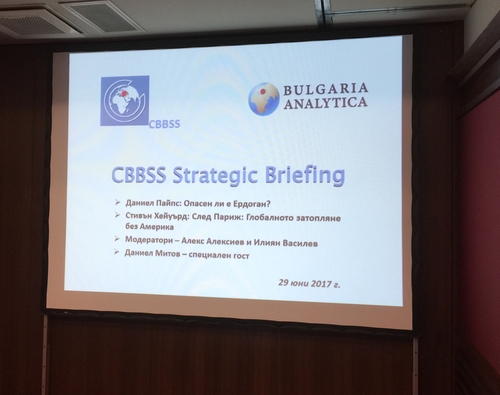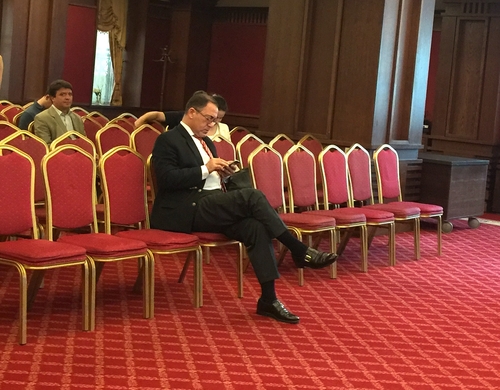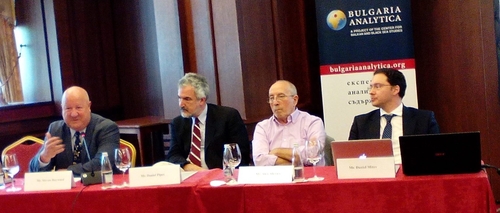In February, Turkey's ambassador to Israel told this author to stay away from his country; at least he did so diplomatically. In June, Turkey's ambassador to Bulgaria treated me in a remarkably rude and undiplomatic manner.
The occasion was a talk I gave, "On Turkey and Erdoğan – A Partner or a Threat?" for the Center for Balkan and Black Sea Studies think tank in Sofia. After mentioning my connections to and affection for Turkey, I explained that strongman President Recep Tayyip Erdoğan's inability to reconcile three competing priorities — Islam, Turkey, and Erdoğan — and the resulting contradictions are likely to doom his regime. By the end of the event, Amb. Süleyman Gökçe confirmed that prediction.
 The event. |
He came early, sat in the front row, and jumped up when the question period began. Ominously saying of me, "we know him very well in Turkey," he went on to accuse me of cherry-picking facts and being an essentialist and an Orientalist. My record of "distortion, deflection, and delusion" prompted him to tell me, "I do not agree with any of the points you have raised."
 Amb. Süleyman Gökçe was among the first to arrive. |
Gökçe's threats took two forms: first, stating that no one with a Ph.D. credentials "should have the freedom" to forward allegations such as mine; second, accusing me of espousing the views of the "Fethullah Gülen Terror Organization" – Erdoğan-speak for the non-terrorist Hizmet movement founded by Fethullah Gülen, Erdoğan's once-close ally whose members he now hounds, ostracizes, purges, and jails.
My reply to the ambassador concluded by asking him twice if he could assure my safety going to Turkey. He twice ignored the question. Then he stomped out of the room. That did not quite end his distress, however.
Repairing to Twitter, he responded to eight old tweets of mine concerning Turkey, replying dutifully to each of them, calling me "extremist," "marginal," "pathetic," and "biased." When I replied that "Erdoğan has turned his diplomats into clowns," Gökçe lashed out with yet more insulting tweets.
This incident offers several insights.
Petty intimidation is not normal diplomatic practice. In my own experience, regimes far worse than Turkey's are cleverer. Saddam Hussein sent an ambassador to Washington, Nizar Hamdoon, who advanced his monstrous leader's interests through politeness, self-criticism, and logic. The Islamic Republic of Iran recently hosted this analyst on three of its media in one week: the English-language television (Press TV), the English-language newspaper (Tehran Times), and the Arabic-language news service (MehrNews). Erdoğan's incompetence in this arena is doing him great damage.
Gökçe's antics put off others too. A fellow panelist at the Sofia event, journalist and scholar Steven Hayward, wrote that his "was an astonishing performance from someone in a formal diplomatic post." Ilian Vassilev, the former Bulgarian ambassador to Moscow, also present at the event, called Gökçe's behavior "highly irregular." Eric Edelman, a former U.S. ambassador to Turkey, characterized this show as "all-too typical" of Erdoğan's diplomacy. Richard Pipes, a professor of Russian history (and my father), asked if Soviet diplomats ever harassed him like this during the Cold War, replied, "No, never. They simply ignored my public appearances in the West. And in the USSR when I spoke they disagreed politely."
 The CBBSS panel, from the left: Steven Hayward, Daniel Pipes, Alex Alexiev, Daniel Mitov. |
Gökçe's behavior in Sofia brought to mind British Prime Minister William Gladstone's celebrated "bag and baggage" speech of 1876, regarding what were known as the "Bulgarian horrors":
Let the Turks now carry away their abuses in the only possible manner, namely, by carrying off themselves. Their Zaptiehs and their Mudirs, their Bimbashes and their Yuzbashis, their Kaimakans and their Pashas, one and all, bag and baggage, shall, I hope, clear out from the [Bulgarian] province they have desolated and profaned.
 Gladstone's "bag and baggage" quote in context. |
Gladstone updated might read:
Let the Turks now carry away their abuses in the only possible manner, namely, by carrying off themselves. Their Diyanet and their TIKA, their DOST and their THY, their Erdoğan and their Ambassadors, one and all, bag and baggage, shall, I hope, clear out from the country they would again desolate and profane.
Sending an ambassador to demean and threaten an analyst at a private educational event is the non-violent equivalent of Erdoğan's bodyguards beating up peaceful demonstrators in Washington. Both are integral parts to suppressing dissent against an increasingly megalomaniacal leader. Erdoğan's officious diplomats inadvertently make enemies for the regime, bringing closer the day when, bag and baggage, they will wear out their already frayed welcome.
Mr. Pipes (DanielPipes.org, @DanielPipes) is president of the Middle East Forum. © 2017 by Daniel Pipes. All rights reserved.
July 18, 2017 addendum: Gökçe responded to this article by tweeting "Dr Pipes attempting to attract attention by twisting facts, regrettably sad...Will decline to respond for it is unworthy...", then blocking me from his Twitter account.
July 27, 2017 update: Gökçe's antics have got him removed four months early from his ambassadorship in Bulgaria. His next post is a self-evident downgrade: Guatemala. The Independent Balkan News Agency provides background for his abrupt departure, focusing on his interference in Bulgaria's elections:
In his time as Turkish ambassador to Bulgaria, Gökçe frequently has been in the headlines amid domestic political controversies, most recently during Bulgaria's March 2017 early parliamentary elections.
Gökçe was the subject of calls from nationalist and other political parties for his expulsion over alleged interference by Ankara in the elections, for supporting former Movement for Rights and Freedoms leader Lyutvi Mestan's breakaway DOST party.
Gökçe was photographed at the founding event of Mestan's DOST party in April 2016 and reportedly was presented at party events around Bulgaria.
Erdogan's Turkey was seen as having switched its backing from the MRF to DOST. Mestan had been ousted as leader of the MRF amid the Russian-Turkish tension over Ankara's downing of a Russian military aircraft, after he publicly backed Turkey in the dispute.
Bulgaria's Foreign Ministry had handed Turkish ambassador Gökçe a note about his actions and behaviour, Prime Minister Boiko Borissov told the National Assembly in January 2016.
Borissov did not specify which "actions and behaviour" on the part of Gökçe had led to the note being handed to the ambassador.
Earlier, however, Borissov had said publicly that there had been attempts by Turkey's president and prime minister to pressure him to take the side of Mestan in the dispute in the MRF.
Gökçe was summoned to Bulgaria's Foreign Ministry in March 2017 after Turkish cabinet minister Mehmet Müezzinoğlu was reported to have made a public call to Bulgarian citizens in Turkey to vote for DOST.
A private source informs me that the Bulgarian government indicated its displeasure with Gökçe in other ways besides those noted above. For example, ministries and other official institutions declined meetings with him. He was also excluded from the Turkish delegation when Prime Minister Binali Yıldırım visited Sofia a month ago.
Comments: (1) I appear to be not alone in noticing, as I tweeted on June 30, that "Erdoğan has turned his diplomats into clowns."
(2) That's one of Erdoğan's minions gone "bag and baggage" from Bulgaria.
(3) I can't wait to follow Gökçe's antics in Guatemala City.
